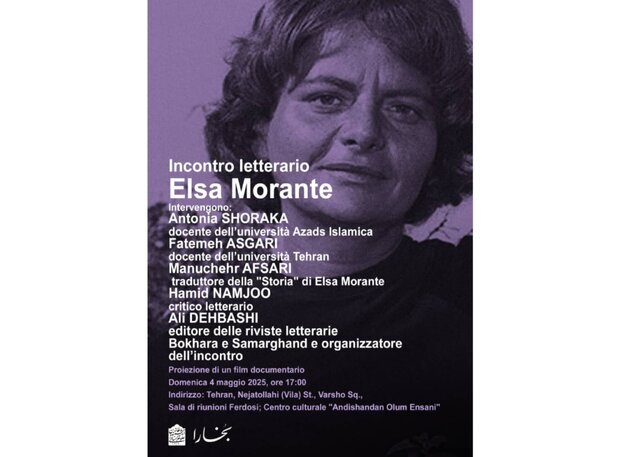“Elsa Morante Night” to be held at House of Humanities Thinkers

TEHRAN-The literary meeting “Elsa Morante Night” will be held at the House of Humanities Thinkers in Tehran on Sunday.
It will be the 834th session of the Bukhara Nights, which is dedicated to exploring the life and works of the Italian writer, researcher, and translator Elsa Morante, ISNA reported.
Speakers at the event include Antonia Shoraka, Fatemeh Asgari, Manouchehr Afsari, Hamid Namjoo, and Ali Dehbashi.
Elsa Morante (1912-1985) was an Italian novelist, poet, translator, and children's books author. She is known for the epic and mythical quality of her works, which usually center upon the struggles of the young in coming to terms with the world of adulthood. Her novel “History” is included in the Bokklubben World Library List of 100 Best Books of All Time.
The event announcement describes Morante’s literary life as a uniquely devoted experience in the realm of 20th-century literature—an author who wholly dedicated herself to literature and fulfilled her longing for living human relationships in passion and ecstasy.
As a chronicler of post–World War II Italy, Morante never ceased to pursue beauty and the thrill of creation. She regarded literature as a luminous testament to the entirety of life, pouring her boundless imagination into it and extending it into the entire realm of reality—joining beauty with truth and raising the flag of love and virtue without ever retreating from exposing the darkness threatening individual and social life.
This perspective was closely tied to her innate gift for storytelling, allowing her to stand as an equal to her husband, the writer Alberto Moravia. Yet Morante rejected many methodical optimizations, intellectual detachment, and pre-defined norms, instead crafting a luminous, ecstatic, and excessive style of writing.
In her novel “History,” Morante writes about her characters from a deliberate distance—so much so that, in her world, “the account of the dead and the living has been erased.” From this distance, the faint, almost animal-like moaning of Ida—a character destined for the asylum—can be heard: “I wish I had never belonged to the human race.” This is just one of many allusions in “History” that point toward the realm of the animal.
Morante cultivated a love for music, books, and cats. Her favorite books included “The Iliad,” “Don Quixote,” and “Hamlet”. She was also interested in Freudian psychology, Plato, and Simone Weil.
Most of Morante's greatest works are shaped by her choices and experiences in life and are reflected in her protagonists. One of the central themes in Morante's work is Narcissism. The majority of Morante's leading characters use autobiography as a way to seek self-therapy and hope. Narration becomes a leading tool. Her writing is essential for the formation of a positive consciousness about her personal memories.
Another important aspect of Morante's work is the metaphor of love. According to her, love can be passion and obsession, and can lead to despair or destruction. Love and Narcissism are themes well connected to each other. Most of Morante's characters seek love, not because they have true feelings for the person they fell in love with, but because they need to cover the feelings of emptiness from their childhood. It is through love and narcissism that Morante introduces other themes, such as the role of motherhood and the meaning of childhood experiences.
A segment of a documentary about Elsa Morante’s life will also be screened during the event.
The House of Humanities Thinkers is located at the junction of Nejatollahi (Villa) and Warsaw streets.
SS/
Leave a Comment